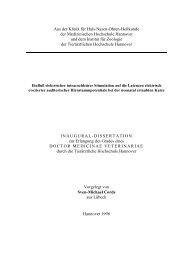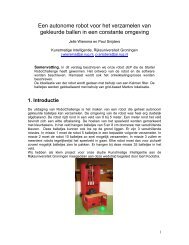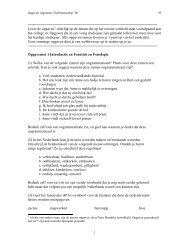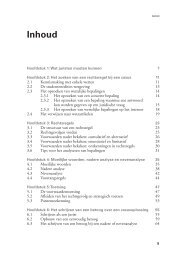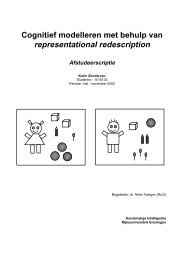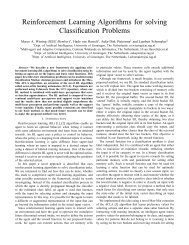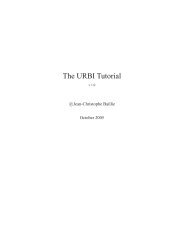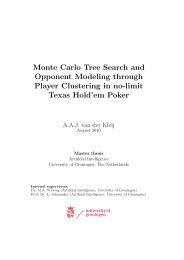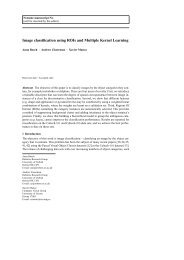Presuppositions in Spoken Discourse
Presuppositions in Spoken Discourse
Presuppositions in Spoken Discourse
You also want an ePaper? Increase the reach of your titles
YUMPU automatically turns print PDFs into web optimized ePapers that Google loves.
Anaphors and Bound <strong>Presuppositions</strong><br />
actually does, it identifies parallel <strong>in</strong>formation. The follow<strong>in</strong>g example shows a use<br />
of too that triggers a presupposition that is understandable from the earlier context<br />
but requires the use of world-knowledge.<br />
(11) too, triggered p: there is lots about someone else’s mother, (2-14 148)<br />
Speaker -b What are you look<strong>in</strong>g for~|<br />
Speaker C Mother‘s . autobiography, **<br />
Speaker A *Oh yes*, A that‘s right, you were go<strong>in</strong>g to weren‘t **you yes**.<br />
Speaker C **I had** your [ko] a copy ly<strong>in</strong>g around on my desk at the project for you<br />
for a long time but you haven‘t . been <strong>in</strong> - - what did I do with it now.<br />
Speaker-b Not the *part of your work which *~|<br />
Speaker A *Well if it‘s still at the project -*, I‘ll collect it on Monday.<br />
Speaker C <br />
Speaker A Pass me my handbag *dear, and I‘ll get out my old pair of glasses - If you‘re giv<strong>in</strong>g oh if you‘re giv<strong>in</strong>g it me that‘s lovely, yes.*<br />
Speaker C *yes here we are - - - you are welcome to have this - a<br />
copy.*<br />
Speaker A Thanks very much - - yes.<br />
Speaker C Well I th<strong>in</strong>k you‘re entitled, as they say .<br />
Speaker A Yes {I th<strong>in</strong>k so} too, thank you - -<br />
Speaker C And lots about your mother too - -<br />
Speaker b Well there would be if they were sisters *and the early part of<br />
her life.*<br />
Speaker C *Yes - - and lots of it was the same life.<br />
Speaker A Quite - - **-** Thank you.<br />
In the above example too triggers the presuppositions that there is lots about<br />
someone’s mother <strong>in</strong> the autobiography. The focus <strong>in</strong> the trigger<strong>in</strong>g expression<br />
(referred to by the possessive noun phrase ‘your mother’) is bound with Speaker<br />
C’s mother, the subject of the autobiography. The presupposed <strong>in</strong>formation cannot<br />
b<strong>in</strong>d with <strong>in</strong>formation contributed by a particular l<strong>in</strong>guistic expression as was the<br />
case <strong>in</strong> example (10), but <strong>in</strong>stead the antecedental <strong>in</strong>formation is follows from what<br />
we know about autobiographies. In someone’s autobiography we will f<strong>in</strong>d a great<br />
deal of <strong>in</strong>formation about that particular person.<br />
The analysis of the excerpted too examples were also done by a second<br />
annotator because it seemed to differ so much from the other trigger types, and<br />
identify<strong>in</strong>g the presupposed material and antecedent material was a much more<br />
complicated, but generally successful, task. It was almost always possible for both<br />
annotators to identify a theme or focus which the speaker might have meant,<br />
though <strong>in</strong> some cases this was vague or unclear.<br />
In summary, it was not difficult to identify where similar or identical<br />
<strong>in</strong>formation was <strong>in</strong>troduced <strong>in</strong> the discourse. The potential difficulty lies <strong>in</strong> then<br />
determ<strong>in</strong><strong>in</strong>g if the <strong>in</strong>formation contributed by the antecedent is meant to refer to<br />
the <strong>in</strong>formation conta<strong>in</strong>ed <strong>in</strong> the <strong>in</strong>duced presupposition, and to justify the decision<br />
to consider the one an antecedent of the other. The problem of determ<strong>in</strong><strong>in</strong>g if the<br />
triggered presupposition is really be<strong>in</strong>g bound to someth<strong>in</strong>g, and what k<strong>in</strong>d of<br />
73



